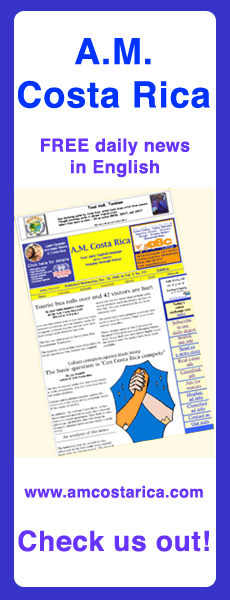Costa Rica Expertise LLC
Categories: Property Protection, Registration
04/30/07
Country Just Sets Itself Up For One Crisis After Another
By Garland M. Baker
Special to A.M. Costa Rica
The rule of thumb in Costa Rica is when you cannot plan — or do not plan — panic.
This malady is part of the culture. People in the campo, the rural areas, learn this from childhood. Parents instruct kids sent to the pulperia, the corner mom and pop grocery, to buy one egg for breakfast. Not two, one for breakfast and one for lunch, or three, one for breakfast, one for lunch and one for dinner. Just one. One for breakfast.
Why, because the parents were not taught to plan and organize by their parents, so they do not teach their kids to do so.
03/05/07
The Legal Right to Steal: A Valid Power of Attorney
The Gringo never even saw it coming
By Garland M. Baker
Special to A.M. Costa Rica
A U.S. citizen returned to Costa Rica in February 2003 to find his lawyers living in his Pacific coast villa. They had taken all his possessions and burned them to complete the takeover.
A criminal court case ensued, and the lawyers won. They got away with transferring millions of dollars in real estate to different companies to cover their tracks of plunder.
02/05/07
Clues in Land Fraud Cases Gaining More Importance
Crooks are getting smarter
By Garland M. Baker
Special to A.M. Costa Rica
A good detective can catch crooks in Costa Rica. The court now voids contracts, deeds, documents and deceptive acts more than before based on mere indications and clues of wrongdoing. Good thing too, because day by day the wicked get worse and believe that they can get away with anything here.
Even expats get caught up in stealing property and other assets that are not theirs because they believe they will not get caught by the law. It is true the judicial system is slow and inefficient at times, but it is equally true the country is striving to make it better.
Legal issues in Costa Rica involving theft and fraud usually form a triangle of players: the victim or plaintiff, the defendant and a third party. For example, in property fraud, the victim represents the true owner, the defendant is the crook, and the third party the person who bought land from the crook.
01/08/07
You Can Loan Money There and Secure Property Here
Technique opens up other sources for cash
By Garland M. Baker
Special to A.M. Costa Rica
Can a person or an institution lend money anywhere in the world in any currency and tie up assets here? The answer is yes, and to do so is not hard but a little technical.
Many foreigners would like to buy property in Costa Rica but do not have any credit in this country. Or they would prefer to work with their lender back home.
As the world shrinks, some lenders are looking for ways to lend money to real estate buyers in Costa Rica. But they do not know how to register a security interest here.
11/27/06
Title Insurance Here Can Cause Misunderstandings
By Garland M. Baker
Special to A.M. Costa Rica
Is title insurance legal in Costa Rica?
An Instituto Nacional de Seguros ruling Sept. 29 says that title insurance was not legal in this country but that now it is and has been since July of 1997. However, insurance officials say the legality could change in the future.
The decree from the legal department of the insurance monopoly explains title insurance is not insurance but a guarantee or a bond. This finding is a flip flop of the insurance monopoly's last ruling in 1976 that said title insurance is an insurance and that no company in Costa Rica can sell it except for the monopoly known as INS.
Costa Rica Expertise LLC
This web site contains articles written by Garland M. Baker and Lic. Allan Garro for the A.M. Costa Rica. These articles contain important information that everyone doing business—personal and corporate—in Costa Rica ought to know. Reach them at [email protected]
A Complimentary Reprint is available at the end of each article.
Search
Categories
| Mon | Tue | Wed | Thu | Fri | Sat | Sun |
|---|---|---|---|---|---|---|
| << < | > >> | |||||
| 1 | 2 | 3 | 4 | |||
| 5 | 6 | 7 | 8 | 9 | 10 | 11 |
| 12 | 13 | 14 | 15 | 16 | 17 | 18 |
| 19 | 20 | 21 | 22 | 23 | 24 | 25 |
| 26 | 27 | 28 | 29 | 30 | ||
Links
Government Web Sites- Caja Costarricense de Seguro Social
- Direccion General Migracion Costa Rica
- Gobierno de Costa Rica
- ICE
- Instituto Costarricense de Turismo
- Instituto Nacional de Seguros
- La Gaceta - Diario Oficial
- La Procuraduría General de la República
- Ministerio de Justicia
- Ministerio de Trabajo y Seguridad Social
- Poder Judicial
- Radiografica Costarricense S.A.
- Registro Nacional
- Registro Nacional Sistema de Consultas
- Colegio de Abogados
- Colegio de Arquitectos
- Colegio de Contadores Privados
- Colegio de Contadores Publicos
- A.M. Costa Rica
- All CR Expertise Articles
- Babelfish Web Site Translator
- Carfax.com
- Currently Suspended Lawyers
- Google Earth - formerly Keyhole - 3D satellite imaging
- U.S. Department of State
- U.S. Visa Denials Page
- U.S. Visa Home Page
- United States Embassy in Costa Rica
- US Embassy Death Assistance Page
Syndicate this site 
What is RSS?

powered by
![]()



